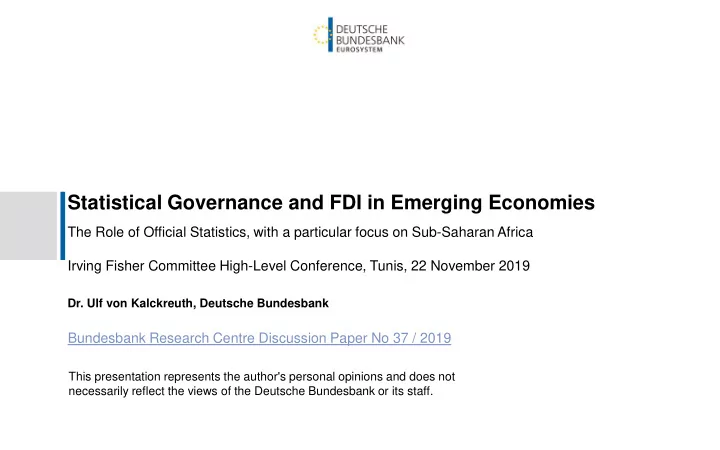

Statistical Governance and FDI in Emerging Economies The Role of Official Statistics, with a particular focus on Sub-Saharan Africa Irving Fisher Committee High-Level Conference, Tunis, 22 November 2019 Dr. Ulf von Kalckreuth, Deutsche Bundesbank Bundesbank Research Centre Discussion Paper No 37 / 2019 This presentation represents the author's personal opinions and does not necessarily reflect the views of the Deutsche Bundesbank or its staff.
Governance and investment • G 20 in 2017: Compact with Africa • Fundamental issue with investment: information asymmetries The „owner“ of a project knows more than the outside investor Ex ante (hidden state): Ex post (hidden action): The investors get to see only bad projects, the good Project owners are able to manipulate project projects are reserved for well connected insiders outcomes to their favour, damaging the investor. → adverse selection, „market for lemons“ → principal agent problem Investment will simply not take place! Ulf von Kalckreuth 11 November 2019 Page 2
Contribution of official statistics Major role of official statistics in relieving information asymmetries • Concerning actions of government -- an important player! • Concerning developments in the country, the sector, the market. Evolution of international rules for statistics driven by traumatic events and crisis • „Fundamental Principles“ of UN following the breakdown of Soviet-style communism. • SDDS and GDDS of IMF, following the “Asian Crisis” IMF Data Dissemination Standards: The two flavours • SDDS: Set of rigorous rules for well developed statistical systems. Founding members more or less G20 countries of today. Compliance checked by IMF and evaluated publicly. • GDDS: Looser set of rules with a lower degree of commitment. Core obligation is to give an exact description of the current state of the statistical system and to commit to a country-specific road- map, using GDDS as a framework. In exchange, the IMF offers a lot of technical help. GDDS lis ike a blueprint for This paper uses adoption of GDDS as an the Compact with Africa indicator of statistical governance Ulf von Kalckreuth 11 November 2019 Page 3
The spread of IMF data dissemination standards Ulf von Kalckreuth 11 November 2019 Page 4
GDDS and FDI -- how are they related? 0 0 1 1 Spike 10 6 GDDS=1 GDDS=0 Sub-Saharan Africa All countries 1) Non-parametric comparisons 4 Density Density of episodes with and without GDDS 5 • Strong and significant differences 2 • FDI higher under GDDS , also under outlier control and eliminating zero episodes 0 0 0 0 .2 .2 .4 .4 .6 .6 .8 .8 0 0 .2 .2 .4 .4 .6 .6 .8 .8 • Raw difference especially high for SS Africa IFDI/Inv IFDI/Inv Graphs by GDDS Graphs by GDDS 2) Fixed effects regressions on log inward FDI to remove time and country effects, and quantile panel estimations to account for heterogeneity and outliers After removing time and country effects we find: • Negative effect of GDDS in sub-sample of rich countries and outside SS Africa! • GDDS effects significantly higher in poor countries and in SS Africa • Estimated effects for SS Africa large, but not significant. Partly due to restrictive assumptions regarding the autocorrelation of residuals. Ulf von Kalckreuth 11 November 2019 Page 5
What can we take away? − Official statistics is an important tool for mitigating information asymmetries that stand between developing countries and outside investors. − A German credo: It is the rules you follow that inspire confidence …! − Information asymmetry is more severe for resource-poor countries . On poor countries, there is often little information, and not much is generated by commercial providers. − Heterogeneity matters . It matters whether a commitment to fundamental rules of governance is made by a resource-poor country or a more sophisticated emerging economy. − For rich countries, the stricter SDDS standard may have been the relevant alternative, explaining a negative coefficient on GDDS! Bundesbank Research Centre Discussion Paper No 37 / 2019 Thank you! Ulf von Kalckreuth 11 November 2019 Page 6
Recommend
More recommend